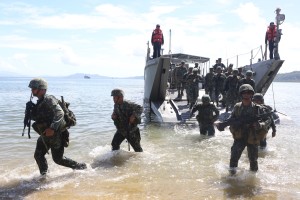PH, US end shortened, scaled back ‘Balikatan’
[ventuno id=’OTM3Mjg1fHwyMzY4fHwxMTE4fHwxLDIsMQ==’][/ventuno]
Philippine and US officials yesterday formally ended a scaled-back, shortened military exchange that shifted focus on disaster relief following President Duterte’s statements seeking an end to the annual exercises called “Balikatan.”
Defense Secretary Delfin Lorenzana led closing ceremonies of the 33rd Philippine-US Balikatan exercises at Camp Aguinaldo.
“This year’s Balikatan proved to be very beneficial and critically important to our armed forces,” said Lorenzana during the ceremonies.
“It allowed us to boost our regional capacity for humanitarian disaster relief operations and for counterterrorism,” Lorenzana said.
“Let us continue this yearly, not just to meet our obligation under the Mutual Defense Treaty but also to strengthen the bond of friendship, as well as our friendly relations with other nations,” he added.

Armed Forces of the Philippines and United States Marines conduct civil military activities from the sea during the Balikatan exercises in Casiguran, Aurora province, May 15, 2017. Casiguran is being eyed as a site of a naval base which will secure Benham Rise. (File photo by NIÑO JESUS ORBETA / Philippine Daily Inquirer)
US Ambassador Sung Kim said the exercises would help the Philippines and the United States face challenges brought by an “increasingly complex and volatile security environment.”
“Now more than ever, our armed forces must work together closely,” said Kim.
“Exercises like Balikatan build upon the long and productive history between our two militaries and ensure that we are always ready to stand shoulder-to-shoulder in defense of our lives, our shared values and international rules-based order,” Kim added.
“Balikatan is indeed a great reflection of our enduring alliance and the deep bond between our two peoples, and I know that we just finished, but we’re already looking forward to training together as friends, partners and allies for next year’s Balikatan,” he said.
Balikatan 2017, which began on May 8, was scaled down from almost 10,000 soldiers last year to 5,400 troops but also included 80 troops from Australia and observers from Japan and Southeast Asian countries.
“Our joint undertakings are manifestations of our commitment to unity, trust and the willingness to come to each other’s aid in times of need,” said Armed Forces of the Philippines Chief of Staff Gen. Eduardo Año.
“Aside from meeting old friends and making new ones, this endeavor has unveiled many breakthroughs significant to our shared aspiration of achieving global security and stability. I am certain that the new learnings from this year’s exercises will enable us to raise the level of our interoperability ever higher,” he added.
Filipino and American troops conducted training exercises in different areas of expertise, including live fire advanced marksmanship, small unit tactics, countering improvised explosive devices, maritime interdiction and amphibious raids.